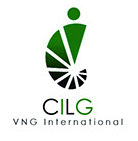VNG International has three daughter companies: MEPCO in the Czech Republic, CMRA in South Africa and CILG in Tunisia. They were established in 2004, 2005 and 2011 respectively. Furthermore, together with the City of The Hague, we established the The Hague Academy for Local Governance, which is, however, not a daughter company but an independent foundation.
The daughter companies were established in close collaboration with the local governments, or their national association, in the respective countries. These remain actively involved, as co-founder and co-owner or through regular consultations, in the development of MEPCO, CMRA and CILG. All three operate on both the national and international local government capacity building market. Thus, they contribute to the in-country development of advisory and consultancy services, owned by local government structures themselves.
This broadens the service range and visibility of the national associations for their members. Nevertheless, it is not always easy to reconcile the business-like approach to advisory or consultancy services and project management of the daughter companies with the more politically defined and policy-oriented approach of the associations. That learning process continues.
As young organisations, working in a niche market, MEPCO, CMRA and CILG alike, invest a lot in staff development and in their visibility and communication. Within the VNG International group we search for maximum synergies between the various organisations, in areas such as market analysis, product development and innovation of our intervention methodologies.
MEPCO, International Advisory Centre for Municipalities
MEPCO provides consulting, management, training and research services to local governments and regions, their institutions and associated businesses throughout the Czech Republic and to a lesser extent on the international market. Key areas of expertise, as developed throughout the years and at the same time reflecting new urban challenges, include a.o.: regional strategic development and regional competitiveness; strategic development within municipalities; smart office and governance; development, funding and project management. In these various areas MEPCO is known for its innovative approaches. It wants to be an initiator for implementation of new urban topics among municipalities.
In 2016 new assignments were won in all the mentioned areas, directly from municipalities and regions, from Czech ministries, the Czech national association of local governments SMO, and as part of international consortia with funding originating from the EU and the Dutch government. Due to its legal status as Ltd. MEPCO has difficulties qualifying for relevant EU programmes. This is partly solved through cooperation with SMO, municipalities and NGOs. In view of strengthening its research work, MEPCO is also extending its cooperation with the academic sector.
CMRA, Centre for Municipal Research and Advice
In CMRA’s portfolio the international market still provides for the largest share. Relevant areas of expertise include local economic development and improving the business climate within municipalities; social housing; resource mobilisation; and support to Catchment Management Areas (CMAs) in the field of Integrated Water Resource Management. CMRA has a strong track record in setting up and managing horizontal learning processes with groups of municipalities, in the form of benchmarking cycles.
Assignments on the national market have been won from the Department of Public Services and Administration (DPSA). CMRA envisages to grow on this home market.
After over 10 years of managing CMRA, CEO Frank Burgers left the company early 2016. In January 2017, Letticia Naid started as his successor, coming over from the South African Local Government Association, SALGA.
CILG, Centre for Innovative Local Governance
In the only five years since its establishment, CILG has gained firm recognition as a resource centre for its expertise in support of positive change in the MENA region. CILG has very good relations with Tunisian local governments, their association, and related national institutions. It is good at bringing together European and domestic expertise and best practice, and has a deep knowledge of the local context and culture.
Key areas of expertise include: democratic transition and decentralisation; local governance and more specifically urban democratic governance; local economic development including public-private partnerships, employability and entrepreneurship; support to gender equality and civil society; security, migration and cross-border cooperation. Funding comes mainly from foreign sources, such as the EU, Danida, and the Dutch Government. The Tunisian Government still faces political and security crises, which affects the local market opportunities. In 2016 CILG did get an assignment from the city of Tunis.
The Hague Academy for Local Governance
Although not a daughter company, The Hague Academy for Local Governance must also be mentioned here, as a foundation specialised in local governance training and firmly rooted in the VNG International network.
The Academy annually trains about 1000 professionals from national and local governments (56%), NGOs (30%) and donor and development organisations (14%).
It offers open subscription courses in The Hague and tailor-made training. Tailor-made training programmes are delivered both in The Hague and abroad. For training in the MENA-region, for example, The Hague Academy for Local Governance works closely together with CILG.
The training modalities that the Academy offers are:
- multi-annual action learning programmes;
- short courses and exposure visits;
- Training-of-Trainer programmes;
- online learning;
- capacity development of training institutes.
The programmes are all very much practice oriented. Topics vary from (fiscal) decentralisation, local leadership, citizen participation, gender responsive governance and integrity & anti-corruption to local security & social cohesion, local economic development and multilevel water governance. New topics that were recently developed are smart cities and migration.
Since 2009, The Hague Academy has its own scholarship programme for young, talented municipal employees, called Talent for Governance.
VNG International Annual Update 2017
9 Our Daughters companies




